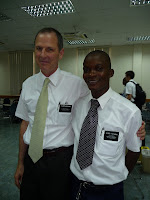I was busy last weekend and did not have time to get a blog posted. Apologies to anyone who noticed.
We have had a number of visitors these past two weeks. Let me describe them. They each have unique stories.
Lee Clegg is from Phoenix Accra Ghana Ghana Ghana
Our next visitor was W. Cole Durham. Cole is the Susa Young Gates University Professor of Law at the J. Reuben Clark Law School. He was here in Accra
We spent an evening together reminiscing about “the good old days” and sharing some of Marsha’s warm chocolate chip cookies (thanks to Lee Clegg’s bag of chocolate chips.) Cole travels the world teaching and consulting on legal cases. He described an upcoming appearance before the Supreme Court of Indonesia where he will be involved in a human rights case . He had a deadline to get his opinion to Indonesia
The third visitors were John and Cozette Welling. John is a fourth year medical student at Ohio State Accra Kumasi Ghana Accra Ghana Ghana Amsterdam
So much for our social schedule. A week ago yesterday I went to Korle Bu (the teaching hospital) to meet for the third time with Dr. Kitcher, the head of the ENT department. He invited me to go to the “operating theatre” with him. You’ve heard me describe Korle Bu as WWI buildings not upgraded since being built. It was a pleasant surprise to see the operating rooms which have obviously been remodeled in recent years. The room designated for ENT surgery is generously large with most of the equipment fairly up to date. There is no piped in gas or suction so the anesthesia machine is connected to tanks and the suction machines are portable. There is a ceiling mounted Zeiss operating microscope with a teaching head. The ENT service (staff and two residents) were doing a staging endoscopy for a patient with a base of tongue cancer. I had an enjoyable time meeting the ENT and anesthesia staff, the ENT residents, the operating room personnel, and a number of nursing students. There were about 12 people in the room, making it crowded but easy to meet all of them. Everyone was very cordial. Dr. Kitcher and I talked further about my teaching otology in the training program. My application for Ghana Boise Accra
So much for technical talk. Each day Marsha and I discover something new and interesting about Ghana
Ghanaians have a variety of names. Some are very American sounding like Daniel, Sharon, and Reuben. Some are more native like Awo, Faustina, and Mensah. (By the way these are all individuals we work with each day.) They also all have a name, a “soul name,” indicative of the day of the week upon which they were born. Some use this name and some do not. But if you ask them, they all can give you their day of the week name.
I was asking one of the office staff about this tradition and she was explaining the different names of the week for men and women. I told her I was born on a Friday and asked her what my name would be. I must interject, here, without revealing her name, that this woman is a big, strong woman. (Remember, the women here in
Now the funny part. About a week later Marsha and I were with Dr. Kwesi Dugbatey, a retired physician. (Note his first name, it sure isn’t Fifi. I need to write a blog about him sometime; he has an incredibly fascinating life story that should be in a book or movie.) I mentioned to Dr. Dugbatey my disappointment in learning my Ghanaian birth name, “Fifi.” He looked puzzled, thought for a moment, and then started laughing. It turns out that my Friday birth name is actually Kofi, but when you are a small Kofi you are affectionately referred to as Fifi. I ought to go back to the office staff who declared that my name was Fifi, and straighten her out, but I suspect she would demonstrate, with some kind of bodily harm, why she considers me a diminutive Kofi.
Here is a parting picture taken on the way home to our apartment. There are two sets of twelve barrels secured to the top of this trotro. I can envision the disaster this would be with a low overpass.






















